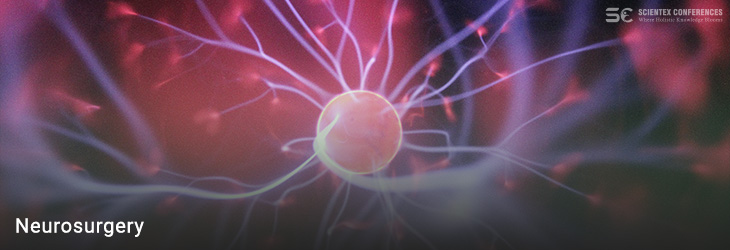Track: Neurosurgery

Session Overview:
This session aims to explore the latest advancements and techniques in the dynamic field of neurosurgery, highlighting its critical role in diagnosing and treating conditions affecting the nervous system. As a highly specialized discipline, neurosurgery encompasses a wide range of procedures, from minimally invasive techniques to complex brain and spine surgeries. The session will begin with an overview of current trends in neurosurgical practice, including the integration of advanced imaging modalities such as intraoperative MRI and CT scans. These technologies enhance surgical precision, enabling neurosurgeons to visualize intricate anatomical structures in real-time, thereby improving patient outcomes. Key topics will include the management of brain tumours, emphasizing the importance of multimodal approaches that combine surgical intervention, radiotherapy, and chemotherapy. Participants will learn about innovative techniques such as awake craniotomy, which allows for better functional mapping and preservation of critical brain areas during tumor resection. Spinal surgery will also be a focal point, covering advancements in techniques for treating conditions such as degenerative disc disease, spinal stenosis, and trauma. The session will delve into minimally invasive surgical approaches, which reduce recovery times and complications compared to traditional open surgeries.
Recent Developments:
Recent advancements in neurosurgery have revolutionized the diagnosis and treatment of neurological conditions, significantly enhancing patient outcomes. One notable development is the integration of intraoperative imaging technologies, such as intraoperative MRI and CT scans. These tools allow neurosurgeons to visualize the surgical site in real-time, improving precision during complex procedures, particularly in tumor resections. Functional neurosurgery has also seen remarkable progress, especially with deep brain stimulation (DBS) for movement disorders like Parkinson’s disease and essential tremor. Newer stimulation devices and protocols have improved patient selection and outcomes, allowing for more tailored treatments. Telemedicine has emerged as a valuable tool for preoperative consultations and postoperative follow-ups, increasing accessibility to neurosurgical care. Overall, these developments reflect a commitment to innovation in neurosurgery, prioritizing patient safety, efficacy, and quality of care.
Sub Tracks:
Minimally Invasive Spine Surgery:
This sub-track focuses on the latest techniques in minimally invasive approaches for spinal disorders. Discussions will include benefits such as reduced postoperative pain, shorter recovery times, and lower complication rates compared to traditional open surgeries.
Brain Tumor Surgery and Advanced Techniques:
Explore the cutting-edge methods for the surgical treatment of brain tumors, including awake craniotomy and the use of intraoperative imaging. This sub-track will also address approaches for optimizing tumor resection while preserving critical brain functions.
Management of Traumatic Brain Injury (TBI):
This sub-track will cover the latest strategies in the assessment and surgical management of TBI, including decompressive craniectomy and advancements in neurocritical care that improve outcomes for patients with severe head injuries.
Surgical Treatment of Epilepsy:
Delve into the current surgical options for managing epilepsy, focusing on techniques such as temporal lobectomy and the use of responsive neurostimulation. Discussions will include patient selection criteria and long-term outcomes.
Functional Neurosurgery for Movement Disorders:
Examine the advancements in functional neurosurgery techniques, particularly deep brain stimulation (DBS), for treating movement disorders like Parkinson’s disease and essential tremor. This sub-track will highlight patient selection, programming, and outcomes.
Pediatric Neurosurgery:
Explore the unique challenges and techniques in pediatric neurosurgery, including the management of congenital anomalies, brain tumors, and traumatic injuries in children. Emphasis will be placed on age-specific considerations and advancements in surgical techniques.
Neurovascular Surgery:
Discuss the latest developments in neurovascular surgery, including endovascular techniques for treating conditions like aneurysms and arteriovenous malformations (AVMs). This sub-track will highlight innovative approaches that minimize risks and improve patient outcomes.
Advances in Neuro-Oncology:
Investigate the recent progress in neuro-oncology, including new surgical techniques, adjuvant therapies, and targeted treatments for brain tumors. Discussions will focus on multidisciplinary approaches to enhance treatment efficacy and patient quality of life.
Scientific Highlights
- Audiology
- Anatomical and Physiological Disorders of ENT
- Lung Disease/ Airway Issues
- ENT Infections and allergies
- New treatment Advances in Otolaryngology
- ENT Instrument study
- Neurosurgery
- Ear & Nose plastic surgery
- Endoscopic and laparoscopic ENT surgery
- Craniofacial & Facial surgery
- Otology and Neurotology
- Para Thyroid disease /pregnancy
- Diabetes and Hives Treatment
- ENT Microsurgery
- Oral Medicine/ Implant in ENT
- COVID -19 and ENT
- Pediatric Otolaryngology
- Speech therapy and Pathology
- ENT Healthcare in Nursing
- ENT Rehabilitation

